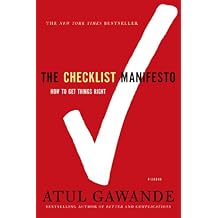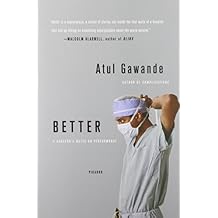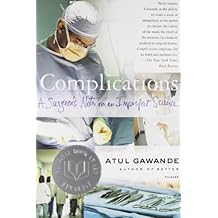Recently I've been reading books by Atul Gawande. He has written four books and I've read all of them. He writes from the perspective of being a doctor, specifically a general surgeon based in Boston. He has been writing for the New Yorker for a while so a couple of these books have come from collections of those essays.


This book is about how different occupations use checklists to improve outcomes. The aviation industry has been most successful in training their pilots and other staff to use checklists so that good outcomes happen almost every time. The commercial airline industry has an amazing safety record as a result. Checklists are also used extensively in building large and very complex buildings. The stakes are high in both of these cases where hundreds or even thousands of people could die if there are failures. Medicine surprisingly has not, until recently, used checklists, so Gawande resolves that they are going to create a surgical checklist so that outcomes improve. With the help of others, he creates a checklist and tests it all over the world. It does, in fact, significantly improve outcomes. I guess it's a little surprising that no one has thought to implement this before.
This book was not quite as interesting to me even though I personally love checklists. It was a little slow to get into, but in the end it was worth it. Warning: The last story in the book has a fairly graphic depiction of a surgery where the checklist saved a man's life.
The next book is called Better: A Surgeon's Notes on Performance.

I listened to this book on my phone because, surprisingly, it was hard to find a hard copy of it in our local libraries. I enjoyed this book quite a bit. I especially liked the chapter on collecting outcomes among different hospitals in treating specific diseases. The Cystic Fibrosis Foundation has led the way on this. Because of this, they know exactly which centers are the most successful in treating cystic fibrosis, and the differences can be quite large. He contrasted the most successful in the nation, located in Minneapolis, and one of the less successful in Cincinnati. He suggests that greater transparency is desirable so that people can make comparisons about where they want to be treated but doctors and hospitals have to be willing to open up. Personally, I would love to be able to compare the success of our pediatric renal transplant clinic that we visit every 3-4 months with the success of similar clinics. I don't know if that's going to ever happen though.
This whole book was quite interesting and he did a good job on every topic he chose to address.
The last book is called Complications: A Surgeon's Notes on an Imperfect Science

This is his first book, written while he was a resident in general surgery. It's a little scary to hear about how little those new residents really know. He is very upfront about this as well as how imperfect the practice of medicine really is. Doctors don't always know what they're doing and he has lots of stories to illustrate that. The whole book is quite interesting to me and I recommend it as well.
Here's my take:

This is a great book for people to read as they think about how they want to make those end-of-life decisions. Sometimes those happen a lot sooner than you think they will. The author tells the story of a fairly young woman who has just barely had her first baby and is diagnosed with a very aggressive terminal cancer. They try to treat it without much success. In the end, probably because she's so young, no doctor will tell her that she really doesn't have any time left so they continue to try to cure her in the hospital when a better choice would have been to accept the inevitable and stay home being made comfortable on hospice. Instead she dies in the hospital on life support. The author also talks about other people who have better outcomes, including his father, because the doctor has asked the right questions and made the choices clearer. He also addresses nursing homes and assisted living.
This is an excellent book but a little bit depressing to read as you think about the inevitability of aging and death and what it involves in our modern society. However, probably everyone should read it.

This book is about how different occupations use checklists to improve outcomes. The aviation industry has been most successful in training their pilots and other staff to use checklists so that good outcomes happen almost every time. The commercial airline industry has an amazing safety record as a result. Checklists are also used extensively in building large and very complex buildings. The stakes are high in both of these cases where hundreds or even thousands of people could die if there are failures. Medicine surprisingly has not, until recently, used checklists, so Gawande resolves that they are going to create a surgical checklist so that outcomes improve. With the help of others, he creates a checklist and tests it all over the world. It does, in fact, significantly improve outcomes. I guess it's a little surprising that no one has thought to implement this before.
This book was not quite as interesting to me even though I personally love checklists. It was a little slow to get into, but in the end it was worth it. Warning: The last story in the book has a fairly graphic depiction of a surgery where the checklist saved a man's life.
The next book is called Better: A Surgeon's Notes on Performance.

I listened to this book on my phone because, surprisingly, it was hard to find a hard copy of it in our local libraries. I enjoyed this book quite a bit. I especially liked the chapter on collecting outcomes among different hospitals in treating specific diseases. The Cystic Fibrosis Foundation has led the way on this. Because of this, they know exactly which centers are the most successful in treating cystic fibrosis, and the differences can be quite large. He contrasted the most successful in the nation, located in Minneapolis, and one of the less successful in Cincinnati. He suggests that greater transparency is desirable so that people can make comparisons about where they want to be treated but doctors and hospitals have to be willing to open up. Personally, I would love to be able to compare the success of our pediatric renal transplant clinic that we visit every 3-4 months with the success of similar clinics. I don't know if that's going to ever happen though.
This whole book was quite interesting and he did a good job on every topic he chose to address.
The last book is called Complications: A Surgeon's Notes on an Imperfect Science

This is his first book, written while he was a resident in general surgery. It's a little scary to hear about how little those new residents really know. He is very upfront about this as well as how imperfect the practice of medicine really is. Doctors don't always know what they're doing and he has lots of stories to illustrate that. The whole book is quite interesting to me and I recommend it as well.
Comments
Post a Comment